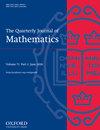椭圆曲线上的Tamagawa积
IF 0.5
4区 数学
Q3 MATHEMATICS
引用次数: 1
摘要
我们显式构造了Dirichlet级数$$\begin{equation*}L_{\mathrm{Tam}}(s):=\sum_{m=1}^{\infty}\frac{P_{\mathrm{Tam}}(m)}{m^s},\end{equation*}$$,其中$P_{\mathrm{Tam}}(m)$是短Weierstrass形式的椭圆曲线$E/\mathbb{Q}$与Tamagawa积m的比例。虽然没有处处都好的约简$E/\mathbb{Q}$,但我们证明了与平凡Tamagawa积的比例为$P_{\mathrm{Tam}}(1)={0.5053\dots}$。作为推论,我们发现$L_{\mathrm{Tam}}(-1)={1.8193\dots}$是$\mathbb{Q}$上椭圆曲线的平均Tamagawa积。我们给出了这些结果在正则高度和韦尔高度上的应用。本文章由计算机程序翻译,如有差异,请以英文原文为准。
Tamagawa Products of Elliptic Curves Over ℚ
We explicitly construct the Dirichlet series
$$\begin{equation*}L_{\mathrm{Tam}}(s):=\sum_{m=1}^{\infty}\frac{P_{\mathrm{Tam}}(m)}{m^s},\end{equation*}$$
where
$P_{\mathrm{Tam}}(m)$
is the proportion of elliptic curves
$E/\mathbb{Q}$
in short Weierstrass form with Tamagawa product m. Although there are no
$E/\mathbb{Q}$
with everywhere good reduction, we prove that the proportion with trivial Tamagawa product is
$P_{\mathrm{Tam}}(1)={0.5053\dots}$
. As a corollary, we find that
$L_{\mathrm{Tam}}(-1)={1.8193\dots}$
is the average Tamagawa product for elliptic curves over
$\mathbb{Q}$
. We give an application of these results to canonical and Weil heights.
求助全文
通过发布文献求助,成功后即可免费获取论文全文。
去求助
来源期刊
CiteScore
1.30
自引率
0.00%
发文量
36
审稿时长
6-12 weeks
期刊介绍:
The Quarterly Journal of Mathematics publishes original contributions to pure mathematics. All major areas of pure mathematics are represented on the editorial board.

 求助内容:
求助内容: 应助结果提醒方式:
应助结果提醒方式:


